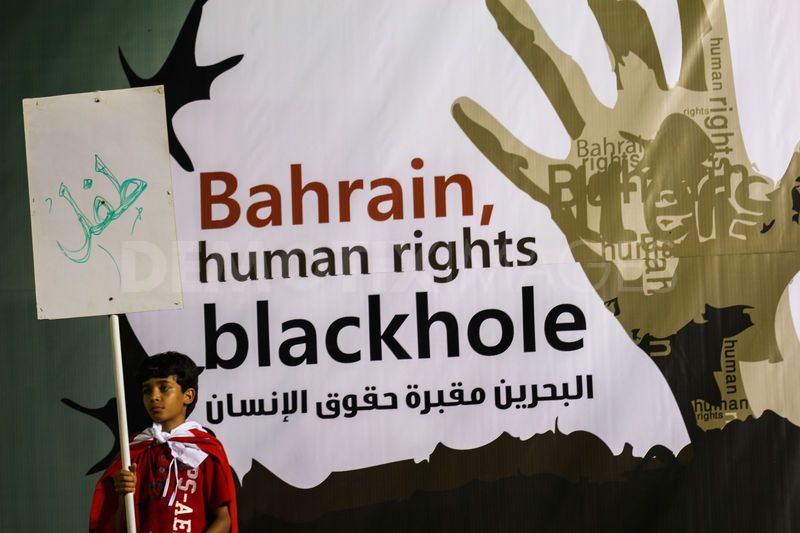Stuck in revolutionary limbo, Bahrain remains to this day the forgotten child of 2011 uprising, a veritable media black hole the press has learned to stay away from to the tune of Saudi Arabia's financial largess. Sitting at the heart of the Arabian Peninsula, the kingdom island represents too much of a geopolitical haven for the Wahhabi kingdom to ever consider letting go of - even if it means single-handedly propping and supporting its political institutions and finances. And that Saudi Arabia had to do a lot of over the past four years.
While Bahrain revolutionaries might not have YET brought the regime to its knees, they quite successfully bled Al Khalifa's coffers dry, forcing the state to almost entirely rely on foreign aid to keep its institutions going. Bank-rolling Al Khalifa's monarchy has become an expensive task indeed; especially now that foreign investors have all but deserted the island kingdom, keen to seek lucrative investments where streets protests are not a permanent fixture.
In this battle of wills, Bahrain revolutionaries have time and resilience on their side! As far as Al Khalifa dynasty is concerned, it could well be midnight has just rung on the kingdom! From a purely historical standpoint, no autocracies have ever been able to withstand popular will, especially not when motivated by a yearning for social justice. The House of Al Khalifa might want to brush up on history and reads in its pages the signs of its pending collapse.
A foreign importation, Al Khalifa monarchy was never representative of Bahrain, its Royals never spoke for Bahrainis either since they did not share in their traditions, history and cultural patrimoine. Worse still, under the rule of Al Khalifa Bahrain has learned to live in perpetual division: Shia versus Sunnis, rich versus poor, nationals versus foreigners … division criteria run deep for such a tiny island lost in between the Persian Gulf.
There lies Bahrain's unspoken tragedy.
Speaking on International Day Al Wefaq National Islamic Society stressed: "Today, Bahrain is in most need for comprehensive peace on all levels far from the destructive security approaches.
The achievement of peace in Bahrain entails a real national project through courageous and genuine political and economic solutions that put the benefits of the country and its citizens in core consideration."
It quickly added, "Peace is a national demand that should be reached by the implementation of justice, balanced representation of all society sides, respect of human rights and democratic principles and equality on the bases of citizenship and law."
It is because Al Wefaq has lobbied for national equality, beyond matters of faith, social status or even ethnicity that Manama exerted its wrath against its most prominent leader: Sheikh Ali Salman (secretary general)
Sheikh Salman, a pivotal figure of Bahrain's revolutionary movement has been languishing in jail under trumped up charges on account of his political activism and insistence to call Al Khalifa on their human rights abuses.
But not even cuffs and window bars have weakened Bahrain's resolve to claim its freedom.
Speaking to his wife from prison, Sheikh Salman told his supporters: "The cuffs and all this only strengthens our determination to demand our rights so that this generation and the coming generation rest reassured about themselves and their futures." Before such strength and nobility of character one cannot help but feel humbled.
How can the liberation of Bahrain be anything else than a matter of time when such men are in the lead?
Standing in stark contrast to the likes of Sheikh Ali Salman, Abdulhadi al-Khawaja, Zeynab Al Khawaja, Nabeel Rajab, Hussain Jawad and so many others, King Hamad ibn Issa stand very much the villain of the story.
As Sheikh Salman so beautifully told his beloved daughter Naba: "The sun is a great blessing that Allah created for all people, and not one can monopolize it and deny others from enjoying it. No one has the right to block the sun from anyone by imprisoning him or her. This country is like the sun, it is a blessing from Allah, and a right for everyone, and its resources are bound for everyone, without any monopolization or discrimination."
There, in between two seas, that of the earth and the skies, Bahrain's prayers await, filled with hope and unspoken fervor.
Against the rule of a despot it is a nation-state which await to be built. Bahrain was never home to the dreaded "Shia revival". Bahrain's revolution was never intended as yet another fracture to an already fragmented society - Bahrainis ambition most of all to proclaim their nation whole and erase those engineered socio-political and religious barriers which Al Khalifa regime worked so hard on perpetuating.
Reducing Bahrain's struggle to a sectarian movement is exactly what Manama has strived for. The logic behind this rationale is actually simple - By highlighting the so-called Shiite nature of Bahrain uprising, Al Khalifa has been able to hedge western powers' fear of Iran to its benefits, projecting his own rule as the only alternative worth having to protect the current regional power dynamics.
Western capitals' eagerness to play war against Bahrainis by opening their military arsenal to Al Khalifa stands testimony to the effectiveness of such strategy. But if guns kill people they can’t kill ideas … and that Bahrain has plenty of.
Whether Royals care to admit it or not Bahrain will fulfill its ambitions … real power ultimately lies in popular legitimacy.
/149

